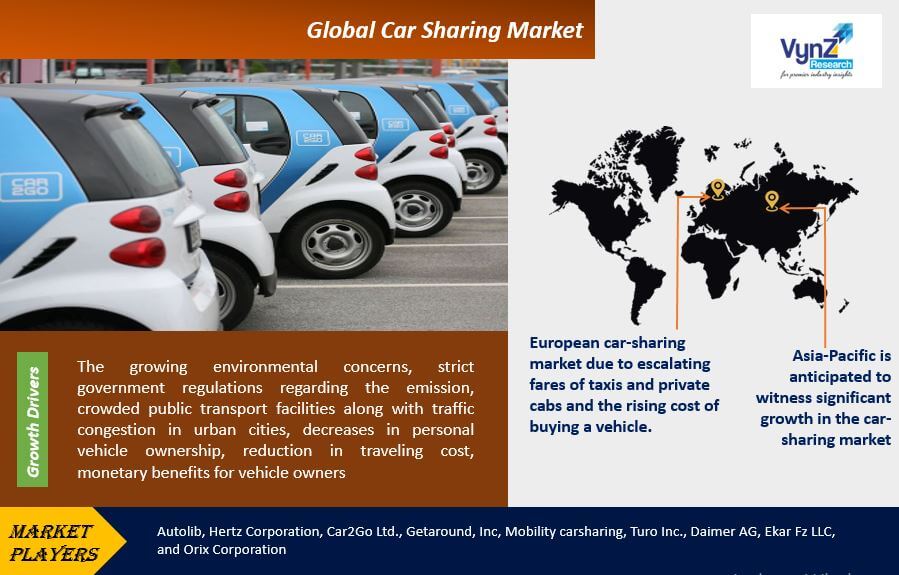| Status : Published | Published On : Apr, 2024 | Report Code : VRAT4018 | Industry : Automotive & Transportation | Available Format :

|
Page : 194 |

Global Car Sharing Market – Analysis and Forecast (2025-2030)
Industry Insights by Model (Free-Floating, P2P, and Station-Based), by Business Model (One Way, and Round Trip), by Vehicle Class (Economy Class, Mid-Range Class, Executive Class , and, Luxury Class), by Fuel Type (Battery Electric Vehicle, Hybrid Electric Vehicle, and, Internal Combustion Engine Vehicles), by Application (Private, and Business) and By Geography (North America,Europe,Asia-Pacific (APAC),Rest of the World (RoW))
Industry Overview
The Global Car-Sharing Market is anticipated to grow from USD 1.92 billion in 2023 to USD 6.2 billion by 2030, thus growing at a CAGR of 20% during the forecast period 2025-2030. Car sharing refers to the practice of sharing a car for regular traveling or commuting. Its market is gaining importance among consumers owing to its flexibility of cars, easy accessibility, and comfortable rides. It is gaining importance in urban areas too due to the reduced transportation costs for a large proportion of the population. The number of passenger cars on the road is also decreasing because consumers in the car-sharing market do not buy cars.

The global car-sharing market is growing substantially owing to the rising acceptance of vehicles assisted with advanced technologies, increasing greenhouse emissions, rising adoption of novel mobility solutions, and strict government regulations regarding emissions. The car-sharing market provides a convenient and cost-effective way of personal mobility by using a transportation network system. Thus, car sharing reduces car ownership, travel costs, and traffic congestion.
The COVID-19 outbreak has changed consumer attitudes, purchasing habits, and demand towards car sharing, resulting in reduced demand for car sharing. COVID-19 has disrupted the car-sharing network market as various countries are facing cash flow problems and low liquidity. However, after the reopening of economic activities in various countries and the robust vaccination drive, the car-sharing market is anticipated to have steady growth.
Car Sharing Market Segmentation
Insight by Model
Based on the model, the global car-sharing market is segmented into free-floating car sharing, P2P (peer-to-peer) car sharing, and station-based car sharing. Among all these models, the free-floating segment accounts for the largest share in the market, due to a high degree of flexibility, and the rising taxi fares. In addition, the P2P car-sharing segment is expected to grow at a significant rate owing to easy access to private car rentals. This model allows car owners to rent their cars that are not in regular use to desired renters who are searching for cars via online platforms owing to the rising number of people who are interested in renting their cars. Thus, the introduction of online P2P sharing platforms, such as Getaround and Turo, will accelerate growth during the forecast period.
Insight by Business Model
Based on the business model the global car-sharing market is bifurcated into one-way, and round trips. Among both business models, the one-way segment dominates the market due to its operational advantage, flexibility, and customer convenience. Furthermore, the one-way segment reduces the hassle for the users to drop off the vehicle at the pick-up point. In addition, round car trip is anticipated to witness widespread adoption owing to their lower cost for long distances and the increasing awareness related to the environmental benefits of these services.
Insight by Vehicle Class
Based on vehicle class, the global car-sharing market is categorized into economy class, mid-range class, executive class, and luxury class. Among these segments, the availability of various models, including high-end and luxury cars with low rents, has influenced the demand for car-sharing services.
Insight by Fuel Type
Based on fuel type, the global car-sharing market is divided into battery electric vehicles, hybrid electric vehicles, and internal combustion engine vehicles. Among these segments, the hybrid electric vehicle is anticipated to grow at a faster pace as they are fuel efficient, reduce the rising fuel price on consumers, and produce less emissions.
Insight by Application
Based on application, the global car-sharing market is divided into private and business. Among both applications, the business application captures the largest share of the car-sharing market due to the rising adoption of rental cars by various businesses. Companies are providing safety, comfort, and convenience to their employees and thus providing pick-up and drop-off facilities to their employees.
Global Car Sharing Market Report Coverage
|
Report Metric |
Details |
|
Historical Period |
2018 - 2023 |
|
Base Year Considered |
2024 |
|
Forecast Period |
2025 - 2030 |
|
Market Size in 2024 |
U.S.D. 1.92 Billion |
|
Revenue Forecast in 2030 |
U.S.D. 6.2 Billion |
|
Growth Rate |
20% |
|
Segments Covered in the Report |
By Business Model,By Vehicle Class,By Fuel Type,By Application |
|
Report Scope |
Market Trends, Drivers, and Restraints; Revenue Estimation and Forecast; Segmentation Analysis; Impact of COVID-19; Companies’ Strategic Developments; Market Share Analysis of Key Players; Company Profiling |
|
Regions Covered in the Report |
North America,Europe,Asia-Pacific (APAC),Rest of the World (RoW) |
Industry Dynamics
Car Sharing Market Growth Drivers
The growing environmental concerns, strict government regulations regarding emissions, crowded public transport facilities along with traffic congestion in urban cities, decreases in personal vehicle ownership, reduction in traveling cost, monetary benefits for vehicle owners, and rising demand for cost-effective and convenient mobility services assisted with advanced technologies are the primary growth drivers for the car-sharing market.
Furthermore, the growing requirement for an efficient vehicle with no carbon emission, mounting alarm about environmental pollution, and strict regulations regarding vehicle emission are also driving the growth of the market. For instance, according to the World Health Organization (WHO), global exposure to ambient air pollution leads to 4.2 million deaths every year. In addition, 91% of the world’s population lives in a place where air quality exceeds the WHO guidelines limit.
Incentives offered by the government to use car sharing in the U.S., rising investments in car sharing by the automobile OEMs in Germany, the proliferation of car-sharing services due to rising traffic congestion in China, favorable regulation in Singapore and Malaysia, increase in digitalization globally, advancement in mobile applications for booking and selecting cars, and lack of proper public transportation infrastructure in developing countries are bolstering the growth for the global car-sharing market.
Car Sharing Market Challenges
Lack of adequate transport infrastructure, unavailability of adequate technologies, limited internet penetration globally, and increasing competition among similar transport models including ride-hailing and on-demand taxi services are the challenges faced by the global car-sharing market. Moreover, poor road conditions in countries such as Turkey, and India, and growing traffic congestion is also hindering the growth of the car-sharing market.
Car Sharing Market Opportunities
The introduction of electric vehicles and the growing popularity of digital car keys are creating opportunities for market investment by industry players and new entrants.
Car Sharing Market Industry Ecosystem
The industry players in the global car-sharing market are leveraging market growth by launching new products to provide urban mobility solutions. Globally, the manufacturing companies that are trying to enter the car-sharing market have to follow stringent regulatory standards. Thus, providing an edge to the established players in the industry.
Car Sharing Market Geographic Overview
Geographically, Asia-Pacific is anticipated to witness significant growth in the car-sharing market owing to the congestion in public transport facilities, rising population base, shortage of parking space, and rise in pollution levels. In addition, rapid urbanization, reduced travel costs, less congestion, and an increase in the preference of the younger population for car-sharing services are also surging growth of the Asia-Pacific car-sharing market. Moreover, China is anticipated to grow at a substantial pace in the Asia-Pacific region due to expanding government support.
Germany accounts for the largest share of the European car-sharing market due to escalating fares of taxis and private cabs and the rising cost of buying a vehicle.
Car Sharing Market Competitive Insight
Key players in the car-sharing market are adopting various strategies such as collaborations and partnerships, focusing on the development of online platforms and mobile applications to market their services, and investing in technologically advanced products across the globe.
Hertz Global Holdings, Inc., (Hertz) is an American car rental company based in Estero, Florida. The company operates its namesake Hertz brand, along with the brands Dollar Rent A Car, Firefly Car Rental and Thrifty Car Rental.
Getaround is an online car sharing or peer-to-peer carsharing service that connects drivers who need to reserve cars with car owners who share their cars in exchange for payment.
Recent Developments by Key Players
Kirk Industries Inc.(a distinguished boutique investment firm) has partnered with Turo (the leading car-sharing platform) to disrupt the rental car industry.
Autolib, Hertz Corporation, Car2Go Ltd., Getaround, Inc, Mobility carsharing, Turo Inc., Daimer AG, Ekar Fz LLC, and Orix Corporation are the key players in the car-sharing market.
The Car Sharing Market report offers a comprehensive market segmentation analysis along with an estimation for the forecast period 2025–2030.
Segments Covered in the Report
- By Model
- Free-Floating Car Sharing
- P2P (peer-to-peer) Car Sharing
- Station-Based Car Sharing
- By Business Model
- One Way
- Round Trips
- By Vehicle Class
- Economy Class
- Mid-Range Class
- Executive Class
- Luxury Class
- By Fuel Type
- Battery Electric Vehicle
- Hybrid Electric Vehicle
- Internal Combustion Engine Vehicles
- By Application
- Private
- Business
Region Covered in the Report
- North America
- U.S.
- Canada
- Mexico
- Europe
- Germany
- U.K.
- France
- Italy
- Spain
- Russia
- Rest of Europe
- Asia-Pacific (APAC)
- China
- Japan
- India
- South Korea
- Rest of Asia-Pacific
- Rest of the World (RoW)
- Brazil
- Saudi Arabia
- South Africa
- U.A.E.
- Other Countries
.png)
Source: VynZ Research
.png)
Source: VynZ Research
Frequently Asked Questions
Purchase Options
Latest Report
Research Methodology
- Desk Research / Pilot Interviews
- Build Market Size Model
- Research and Analysis
- Final Deliverabvle
Connect With Our Sales Team
- Toll-Free: 1 888 253 3960
- Phone: +91 9960 288 381
- Email: enquiry@vynzresearch.com
Car Sharing Market
